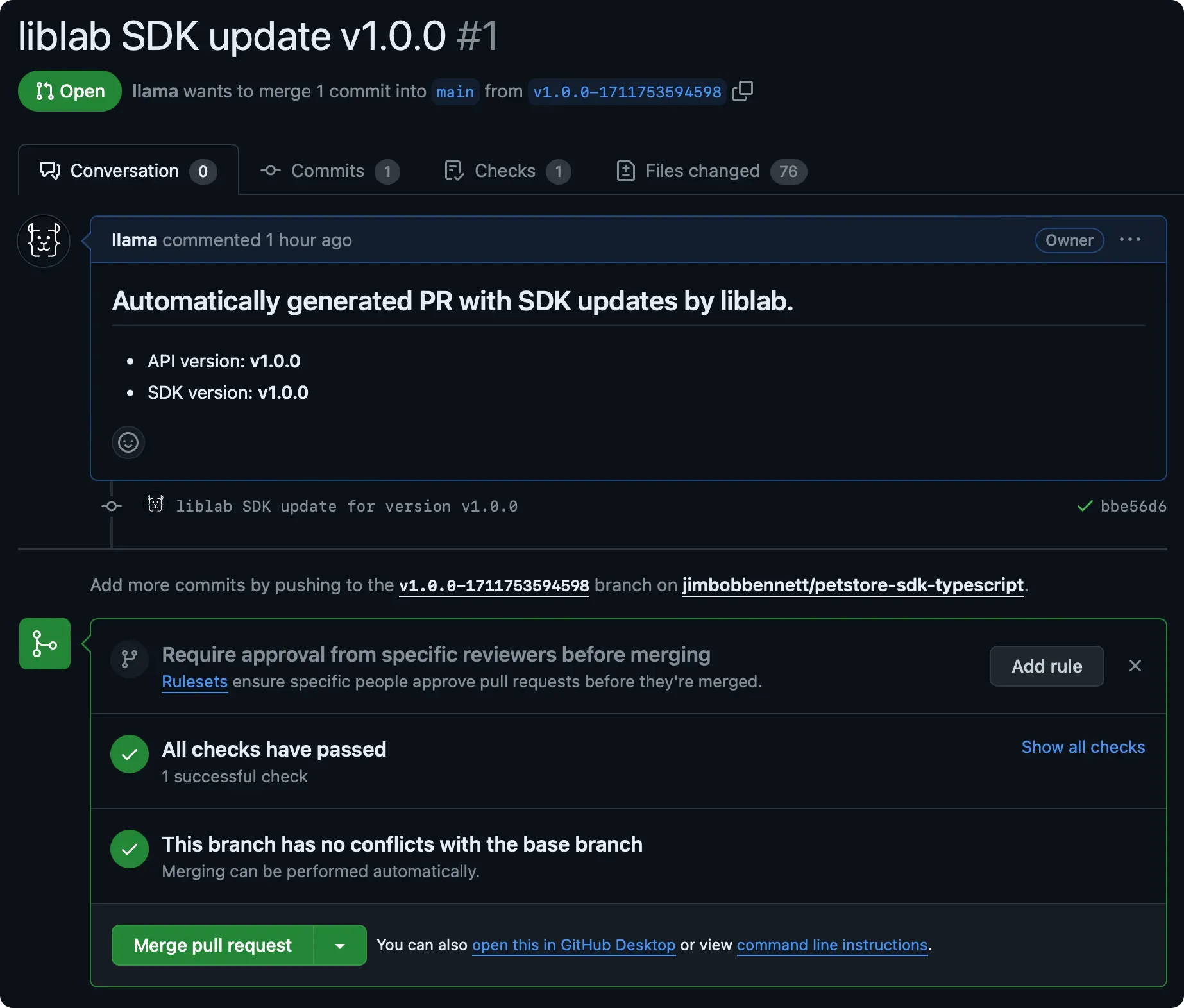Enterprise systems face unique challenges in managing multiple integrations, keeping up with external updates, and ensuring consistent APIs. A well-implemented SDK for enterprise can simplify these complexities, enabling developers to build and integrate applications more efficiently, reduce errors, and accelerate time-to-market.
In this blog post, I'll outline the best practices we have collected at liblab by working closely with Enterprise clients. I'll cover practices from type safety to validation, maintenance, and more.
I will reference OpenAPI specifications as the foundation for building SDKs. An OpenAPI specification serves as a language-agnostic blueprint for describing APIs - their endpoints, operations, and authentication methods.
Type Safety
Strong typing is crucial for Enterprise applications. Proper type handling ensures that data structures match the API specifications exactly, preventing runtime errors and making the code more maintainable. When implementing SDKs, it's essential to properly map regular types, as well as complex data types from OpenAPI specifications.
In strictly-typed languages like Java and C#, which are commonly used in Enterprise projects, it can be challenging to implement complex data types, such as oneOf, allOf or anyOf due to their verbose syntax. SDKs generated by liblab come with complex types and their built-in utilities, which make it easy to construct and manage more complex structures. Following example demonstrates usage of the complex oneOf type in liblab’s Java SDK:
public class Main {
public static void main(String[] args) {
TestSdkConfig config = TestSdkConfig.builder().accessToken("YOUR_ACCESS_TOKEN").build();
TestSdk testSdk = new TestSdk(config);
Address address = Address.builder()
.street("street")
.city("city")
.number("number")
.state(State.CA)
.build();
Person person = Person
.builder()
.firstName("firstName")
.lastName("lastName")
.acceptedTerms(true)
.age(8L)
.address(address)
.build();
OneOfDistinctModels oneOfDistinctModels = OneOfDistinctModels.ofPerson(person);
OneOfDistinctModels response = testSdk.oneOfService.postDistictModels(oneOfDistinctModels);
System.out.println(response);
}
}
Read more about liblab’s Java SDK generator.
OpenAPI Specification Maintenance
One often overlooked aspect of SDK development is maintaining accuracy between the OpenAPI specification and the actual API implementation. While OpenAPI specs serve as the contract between API providers and consumers, they don't automatically stay in sync with the API's reality. Through our experience working with various Enterprises, we've encountered numerous cases where specifications drift from the actual API implementation over time.
Common discrepancies include outdated request and response models, endpoints that no longer exist, and invalid type schemas. These inconsistencies can lead to frustrating development experiences and runtime errors that could have been prevented. The solution lies in treating your OpenAPI specification as a first-class citizen in your development process.
Modern frameworks can automatically generate and update OpenAPI specifications from your API code, ensuring that the documentation always reflects the current state of your API. This approach, often called "code-first" development, helps maintain consistency between your API implementation and its documentation. When your OpenAPI specification accurately represents your API, the automatically generated SDKs become more reliable and trustworthy.
Liblab’s API spec management commands that offer a convenient way to review and manage OpenAPI specs.
➜ liblab validate
Detected 11 potential issues with the spec:
✗ '#/components/schemas/Bird' does not exist
⚠ Info object must have "contact" object.
⚠ Info "description" must be present and non-empty string.
⚠ Operation "description" must be present and non-empty string. (3 occurrences)
⚠ Operation must have "operationId".
⚠ Operation must have non-empty "tags" array.
⚠ Operation tags must be defined in global tags. (2 occurrences)
⚠ Potentially unused component has been detected.
Client-side Validation
Accurate API specifications enable another crucial aspect of SDK implementation: runtime validation. While compile-time type checking catches many issues, runtime validation provides an additional safety layer that can prevent costly errors and improve the developer experience.
Request Validation
Catching errors early, before the actual API requests is made, saves both time and resources. Request validation ensures that the data being sent to the API matches the expected format and constraints. The validation checks not just types but also business rules and constraints defined in the OpenAPI specification. This includes validating required fields, string patterns, numeric ranges, and other constraints that can't be enforced through simple type checking alone.
Response Validation
Response validation is equally important but often overlooked. Consumer code typically makes assumptions about the structure and content of API responses, and invalid data can cause subtle bugs that are difficult to track down. You can catch integration issues early and prevent invalid data from propagating through your application by validating responses against an OpenAPI specification
{
...
"parameters": [
{
"name": "limit",
"in": "query",
"description": "How many items to return at one time (max 3)",
"required": false,
"schema": { "type": "integer", "maximum": 3, "format": "int32" }
}
],
...
}
/// <param name="limit">How many items to return at one time (max 100)</param>
public async Task<List<Pet>> ListPetsAsync(
long? limit = null,
CancellationToken cancellationToken = default
)
{
var validationResults = new List<FluentValidation.Results.ValidationResult> { };
var limitValidationResult = new NumberValidator()
.WithLessThanOrEqualTo(3)
.ValidateOptional<long?>((long?)limit);
if (limitValidationResult != null)
{
validationResults.Add(limitValidationResult);
}
var combinedFailures = validationResults.SelectMany(result => result.Errors).ToList();
if (combinedFailures.Any())
{
throw new Http.Exceptions.ValidationException(combinedFailures);
}
...
}
Robustness
Retry strategies are crucial for maintaining reliability in distributed systems. A well-implemented retry mechanism should include exponential backoff to prevent overwhelming systems during recovery, and proper error handling to ensure issues are reported correctly. It is desirable that the retry logic is configurable to match different environmental requirements and handling various types of failures appropriately.
liblab’s SDKs come with retry settings that enables generating SDKs with out-of-box, fully configurable retry functionality.
Testing
A robust testing strategy is essential for ensuring the reliability of an SDK under various conditions, utilising a range of testing methods. However, one type of testing that is particularly crucial in Enterprise environments, where multiple versions of the SDK might be in use simultaneously, is contract testing. Contract testing ensures that any changes made to the API do not break compatibility with existing SDK implementations. This approach helps prevent unexpected issues by verifying that the API and SDK continue to interact correctly, even as they evolve independently. By maintaining this compatibility, contract testing supports smoother upgrades and more stable integrations, which are vital in complex Enterprise systems.
Readable and Concise (DRY)
SDK maintenance often involves multiple developers and stakeholders that may change over the lifetime of the project. This means your SDKs need to stay readable and concise.
Readability involves using clear and consistent naming conventions that follow language-specific standards and accurately describe the purpose of each component.
Conciseness means following the Don't Repeat Yourself (DRY) principle which can greatly improve maintainability. For example, having support for OAuth in a single, reusable module abstracts away the authentication logic from the core SDK logic. This approach not only simplifies the codebase but also ensures that well-tested authentication mechanisms are consistently applied across the SDK. By abstracting basic functionality developers can focus on the core features of the SDK.
liblab offers out-of-box support for a range of authentication methods, including OAuth.
Streamlining SDK Development
Traditional SDK development often becomes a bottleneck in Enterprise environments. Many organisations face delays in API releases because SDK client libraries need to be updated and tested before deployment. This traditional approach creates unnecessary dependencies between API and SDK teams, slowing down the entire development process.
Modern approaches solve these challenges through automated SDK generationfrom OpenAPI specifications. This automation enables instant SDK creation whenever APIs change, eliminating the wait time between API updates and SDK availability. When integrated into CI/CD pipelines, automated SDK generation ensures continuous synchronisation between APIs and their SDKs, making updates more predictable and reducing release bottlenecks.
liblab’s CI/CD integration automation makes sure SDKs always stay in sync with the most recent changes in your API.

Example of auto-generated pull request on GitHub
Conclusion
Implementing SDKs in Enterprise systems requires careful attention to multiple aspects: from ensuring type safety and proper validation to maintaining robust testing strategies and clear documentation. The shift towards automated SDK generation, powered by well-maintained OpenAPI specifications, represents a significant advancement in addressing these challenges. By following these best practices and leveraging modern tools like liblab, organisations can create more reliable, maintainable, and developer-friendly SDKs that accelerate integration processes and reduce development overhead. As your APIs grow having a solid foundation in SDK implementation becomes not just a technical advantage, but a crucial factor in maintaining competitive edge in the Enterprise landscape.
Before you go, are you ready to transform your API strategy with automated SDK generation? Explore how liblab can help you generate consistent, high-quality SDKs across 6 programming languages from your OpenAPI specification. Your developers—and your budget—will thank you.Build an SDK For Any API
